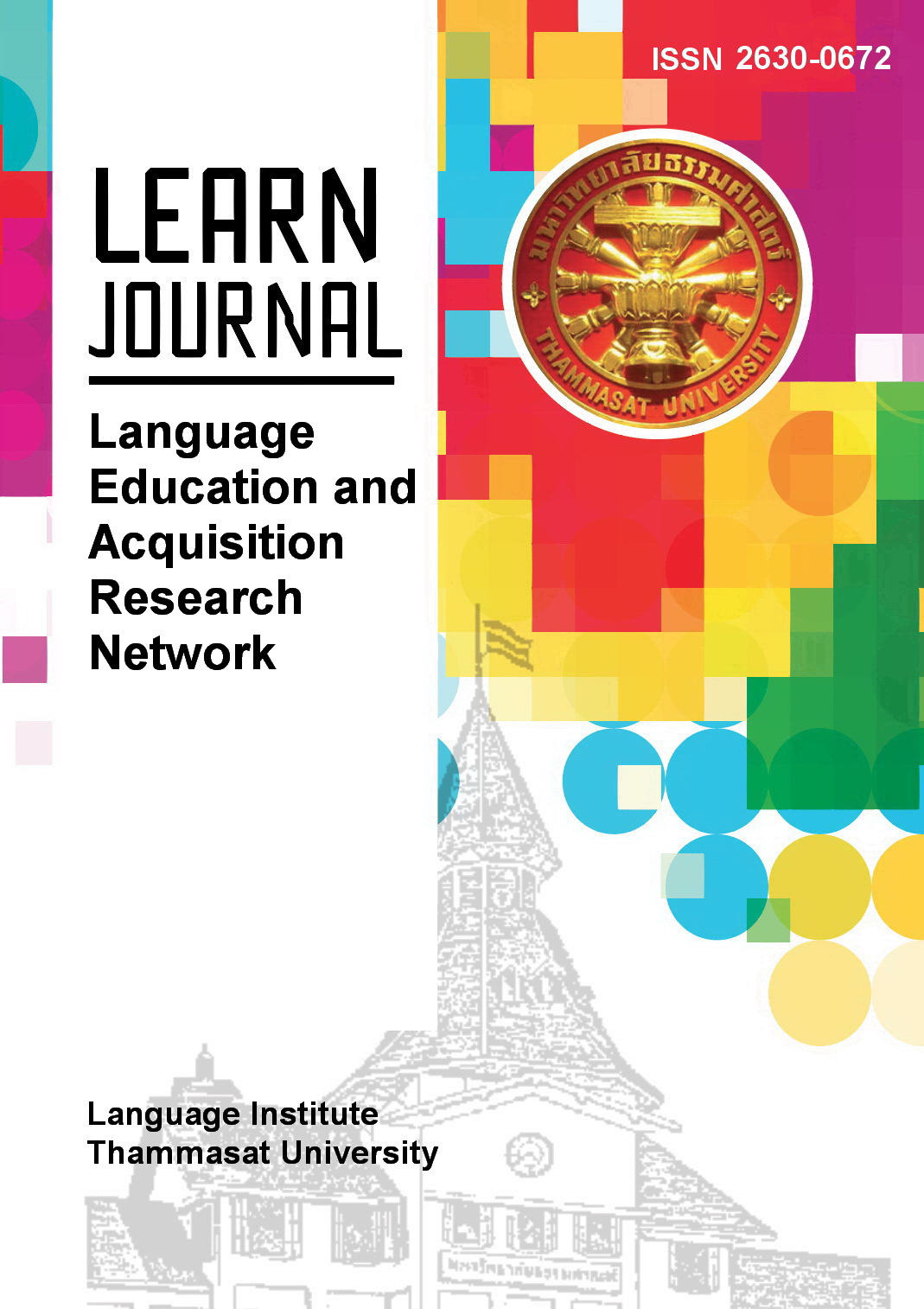Control before Raising in Thai EFL Grammar
Main Article Content
Abstract
This study investigated the acquisition of English control and raising (over Experiencer) constructions with three groups of Thai EFL learners (lower intermediate, intermediate, and advanced). Thai and English, with respect to control, commonly have PRO and infinitive markers, but Thai does not exhibit (subject-to-subject) raising, unlike English. Our hypotheses were based on L1/L2 similarities, access to UG, and previous studies. We hypothesized that Thai learners’ performance on raising would be above chance, based on UG availability and potentials for the learning of English raising suggested in Witoon (2012). In addition, based on L1/L2 similarities and Yoshimura et al.’s (2016) findings, Thai learners’ performance on control would be more accurate than raising. Grammaticality judgment/comprehension trials were employed; results were obtained by ANOVAs. The first hypothesis was confirmed by the intermediate and advanced groups. Tests on the second hypothesis revealed a confirmation; there were ceiling performances across groups on control and a development pattern on raising. The study’s findings suggest facilitation of L1/L2 similarities and restrictions on UG access. Particularly, L2 learners can access linking between PRO and arguments more readily than raising of arguments, suggesting UG access is restricted by marked properties of L2 structures, such as English raising over Experiencer.
Article Details
References
Belletti, A., & Rizzi, L. (2013). Ways of avoiding intervention: Some thoughts on the development of object relatives, passive and control. In M. Piattelli-Palmarini, & R.C. Berwick (Eds.), Rich languages from poor inputs (pp. 115-126). Oxford: Oxford University Press.
Choe, J. (2015). Raising over an experiencer in English L2 acquisition. Available from https://www.bu.edu/bucld/files/2015/06/Choe.pdf (accessed 5.24.2019).
Chomsky, N. (1977). On Wh-Movement. In P.W. Culicover, T. Wasow, and A. Akmajian, (Eds.), Formal Syntax. New York: Academic Press, pp. 71-133.Also available from https://babel.ucsc.edu/~hank/On_WH-Movement.pdf (accessed 9.12.2021)
Crain, S., & McKee, C. (1985). The acquisition of structural restrictions on anaphora. In Proceedings of NELS 16 (1), 94-110. Also available from https://scholarworks.umass.edu/cgi/viewcontent.cgi?article=1593&context=nels (accessed 9.12.2021)
Crain, S., & Thornton, R. (1998). Investigations in Universal Grammar: A Guide to Experiments in the Acquisition of Syntax and Semantics. The MIT Press: Cambridge, MA.
Ekniyom, P. (1977). The topic/comment distinction and passivization in Thai, Working Paper in Linguistics, University of Hawaii 9, 93-110.
Hartman, J. (2011). (Non-) intervention in A-movement: some cross-constructional and cross-linguistic considerations. Linguistic Variation, 11(2), 121-148.
Hoonchamlong, Y. (1991). Some issues in Thai anaphora: A government and binding approach. Doctoral Dissertation, University of Wisconsin-Madison.
Jenks, P. (2006). Control in Thai. Variation in control structures project, University of California, San Diego. Available from http://accent.ucsd.edu/pdf/Thai_Jenks_UCSD_06. (accessed 14.04.18).
Kobsiriphat, W. (1988). Empty categories in Thai. Doctoral dissertation,
University of Washington, Seattle.
Noss, R. B. (1964). Thai reference grammar. Washington, D.C.: Foreign Service Institute.
Nakayama, M., & Yoshimura, N. (2011). L2 acquisition of English expletives and raising constructions. JSLS 2011 Conference
Handbook, 1-2.
Schwartz, B. D., & Sprouse, R. A. (1996). L2 cognitive states and the full
transfer/full access model. Second Language Research, 12, 40-72.
Singhapreecha, P. (2010). Modals and control infinitives: A view of thîi.
Lingua, 120(5), 1288-1312.
Witoon, S. (2012). Thai EFL Learners’ Acquisition of English Psychological
Verbs’ Argument Structures. Master’s Degree Thesis, Thammasat
University.
Yoshimura, N. & Nakayama, M. (2010). Expletives in L2 English and narrow syntax. Ars Linguistica 2010, 237-288.
Yoshimura, N., Nakayama, M., Fujimori, A., & Shimizu, H. (2016). Control and raising constructions in early L2 English acquisition. Second Language, 15, 53-76.


